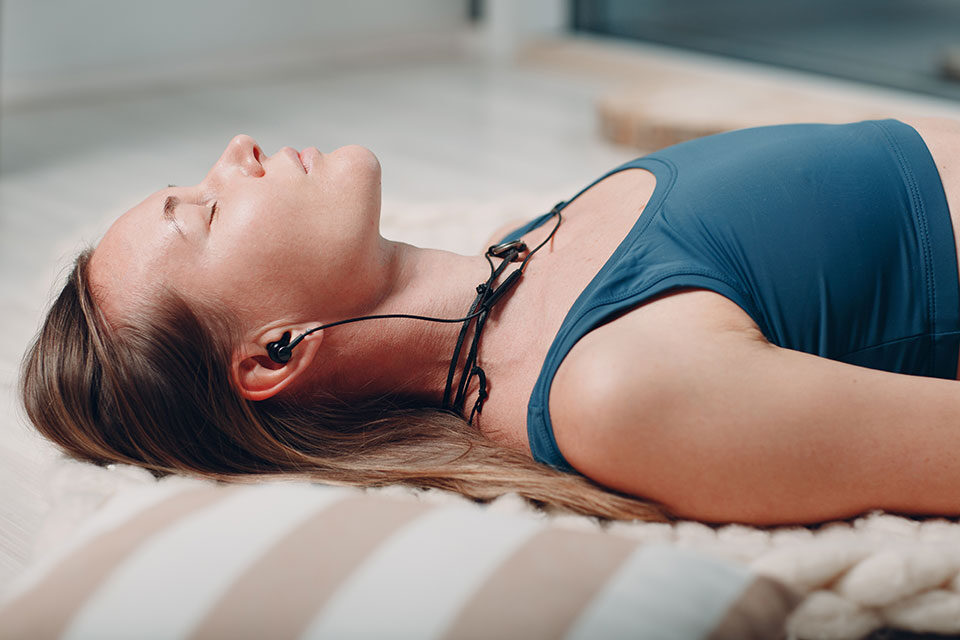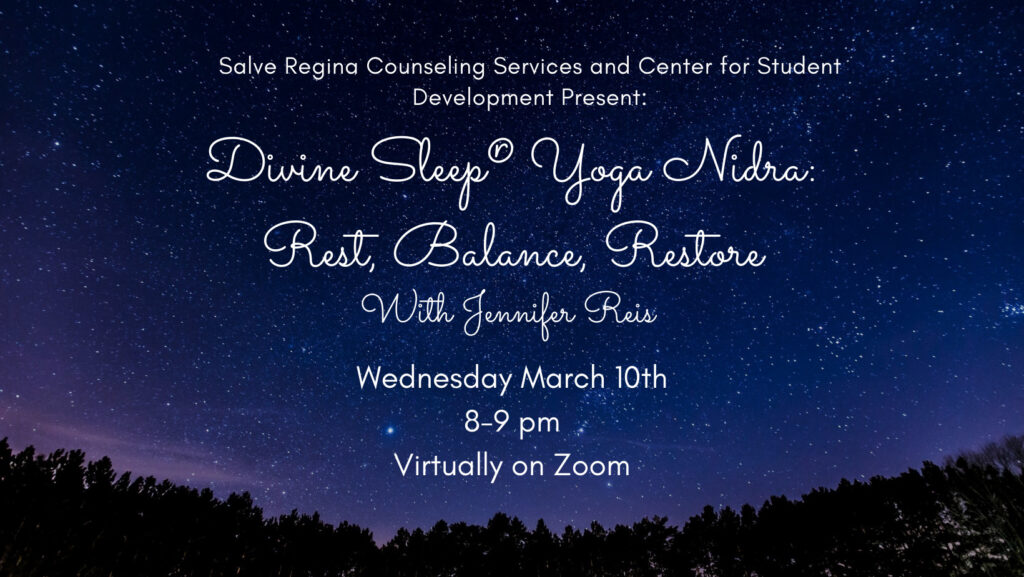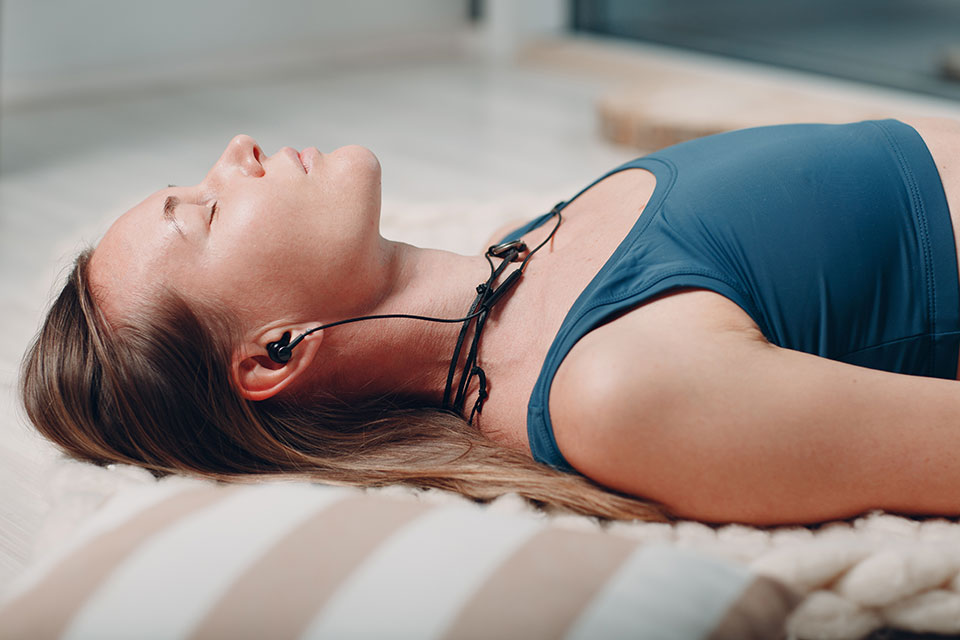Wellness Wednesdays: Join a free guided meditation event to help relax, sleep better

Salve Regina’s Counseling Services and the Center for Student Development are hosting an event called “Divine Sleep® Yoga Nidra: Rest, Balance, Restore” with well-known yoga teacher Jennifer Reis on Wednesday, March 10, from 8-9 p.m. Sign up on the Eventbrite page to receive the Zoom link.
Read below for helpful details on the event, how to prepare for a Yoga Nidra, as well as tips for better sleep.
The importance of sleep, Yoga Nidra meditations
Experts in sleep deprivation recommend that young adults, especially college students, need seven to eight hours of sleep every day. With less sleep, the brain is not getting enough rest — which results in difficulty concentrating on work, studies, relationships and mood regulation. There is some evidence that suggests more people are experiencing challenges with sleep with COVID-19 changes.
Relief is here in the form of “Divine Sleep® Yoga Nidra: Rest, Balance, Restore” with Jennifer Reis. During the event, students can give themselves the gift of a one-hour retreat into healing relaxation that has huge sleep benefits.
Yoga Nidra means “yogic sleep,” and it is a guided meditation practice passed down from yogic tradition that can relieve stress and anxiety — providing participants reconnection with the body and an inner calm that can help achieve deep sleep. It has been said that 30 minutes of Yoga Nidra can produce the effects of 2-3 hours of sleep.
There is nothing required except to lie down in a comfortable position and listen enjoy the Yoga Nidra, but scroll below to find some additional tips for maximum comfort. The event is a free, private experience. A person’s camera and microphone are off, and no one can see them unless they type in the chat publicly.
While the event is free, sign up through the Eventbrite page is required to receive the Zoom link. The link of the recording will be available for one week after the event, so register now for this access even of the original time isn’t doable.
Reis is creator of Divine Sleep® Yoga Nidra, a 500-hour yoga teacher (E-RYT-500), a certified yoga therapist (C-IAYT) and teaches at Kripalu Schools of Yoga and Integrative Yoga Therapy. Her yoga teacher trainings have received worldwide attention — with over 2000 graduates in places Toronto, Chicago, San Diego, Manhattan, Boston, Rekjavik, Melbourne AUS, and other locations. Reis also brings her knowledge of bodywork as an LMT licensed massage therapist who practices Shiastu (based in Chinese Medicine) and Ayurveda.
How to prepare for the “Divine Sleep® Yoga Nidra”
Find a comfortable space on a bed, couch or floor with cushions. Wear warm clothing, as the body temperature tends to drop during a yoga nidra — so things like cozy socks, a sweatshirt and sweatpants, and some blankets could be nice. It’s better to have more layers to take off of the body than not enough. An eye mask or washcloth over the eyes is optional to help block out any light, which leads to a deeper relaxation for many people.
Then it’s time to be led through a calming and peaceful guided meditation. Within this guided meditation, participants will practice deep, calming breathing, guided imagery and visualization, body scan/body awareness, and other relaxation techniques that can reduce stress and promote deep relaxation. The world will slow down and participants will be able to take a break from everyday concerns. This helps promote an ideal state to fall asleep in, and Yoga Nidras are really good to do right before bed.
While the event is free, sign up through the Eventbrite page is required to receive the Zoom link.
Establishing a sleep ritual
Individuals regularly getting high quality sleep often have a sleep ritual, which is a routine that helps the mind and body wind down at the end of the day in preparation for a good night’s sleep. A sleep ritual can include the following:
- Maintain a regular bed and wake time schedule, including on the weekends. Sleeping more hours on the weekend can wreak havoc on someone’s circadian rhythms, so a regular wake schedule is important.
- Establish a regular, relaxing bedtime routine — such as showering and then reading a book or listening to soothing music.
- Create a sleep-conducive environment that is dark, quiet, comfortable and cool. Consider how to enhance comfort in bed with mattress, pillows and blankets (like weighted blankets).
- Finish eating at least 2-3 hours before your regular bedtime.
- Exercise regularly. It is best to complete a workout at least 2 hours before bedtime, as exercising before sleep can leave the body too energized to relax.
- Limit caffeine, nicotine and alcohol particularly if using too close to bedtime.
- Incorporate a guided meditation for sleep (like a Yoga Nidra) as one of the last things to do while lying in bed before trying to sleep.
This article is part of a regular series called Wellness Wednesdays on SALVEtoday. Check out more posts related to health and wellness here.
Featured image by Getty Images/primipil




